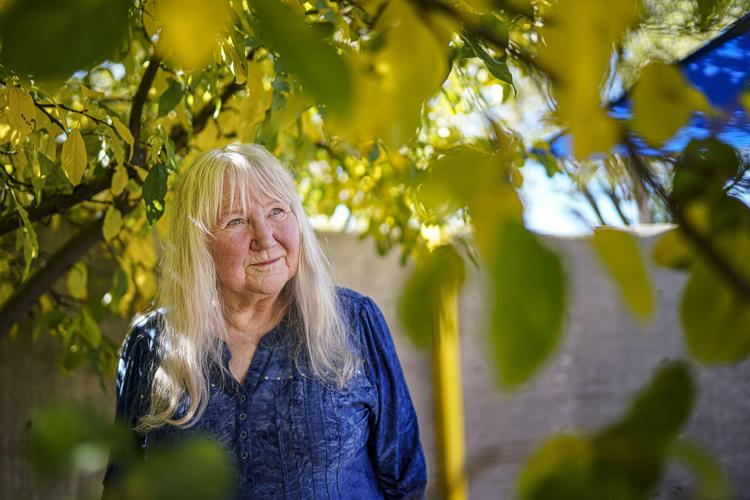By Jessica Pollard jpollard@sfnewmexican.com

By Jessica Pollard jpollard@sfnewmexican.com

Jytte Lokvig is vibrant at 83. But as far as she is concerned, age is only a number.
“You’re the same person. You learn a lot more, but your essence stays the same,” said the Denmark-born artist and advocate.
Lokvig has focused on enhancing the rich inner lives of seniors — particularly those with dementia and other types of cognitive impairment from neurodegenerative diseases like Alzheimer’s. She has made waves in Santa Fe and across the U.S. with her advocacy, direct work with patients and mentorship of caregivers.
In 2008, she founded an Alzheimer’s Cafe in Santa Fe, the first such initiative in the U.S. The informal gatherings provide a place for Alzheimer’s patients and their caregivers to socialize and participate in brain-stimulating activities, such as crafts, music and games.
Before the start of the coronavirus pandemic, there were nearly 1,000 Alzheimer’s Cafes around the U.S., thanks in large part to Lokvig’s volunteer work.
Her efforts have earned Lokvig recognition as one of The New Mexican’s 10 Who Made a Difference for 2021.
Since the late 1990s, she has authored numerous books on caregiving and living with dementia — including The Alzheimer’s Creativity Project. It encourages people to turn to artistic endeavors in the face of memory loss.
Lokvig studied illustration in Los Angeles in the 1970s and then moved to Santa Fe to escape the rush of the L.A. lifestyle — “a whole mad scene,” she said.
She was called upon here to visit a friend’s mother at a “high-end” assisted living facility, and she said she didn’t like what she saw: dementia patients staring vacantly or gazing at a television, completely disengaged.
“It was very disturbing,” she said. “I had made the false assumption that if you pay a lot of money, you’re going to get better [care].”
Lokvig began to make regular visits to the facility, where she would lead art projects such as collages with the residents.
She went on to earn a doctoral degree in Alzheimer’s care and management from California Pacific University and started a career in caregiving.
As she’s mentored other people working to establish Alzheimer’s Cafes in the U.S., Lokvig said the hardest part has been convincing people to forgo proposals for grant funding and a structured program.
Informal, she said, is best.
“When you’re living with dementia, when you’re a caregiver of somebody with dementia, your life is full of structured stuff,” she said. “And what people need more than anything is just a place to be themselves.”
Susan Balkman, 71, said she was pleased when she first saw people with dementia expressing themselves and communicating — verbally and nonverbally — as they enjoyed snacks and art projects at the Santa Fe Children’s Museum during a session of the Alzheimer’s Cafe.
Balkman, a retired therapist, was diagnosed with early onset Alzheimer’s several years ago. Before she met Lokvig, she said, she’d drive in circles around town for hours, uncertain of her surroundings. She felt discouraged when a local doctor told her to “get her papers in order.”
Lokvig showed Balkman how to use a GPS to find her way and encouraged her to pursue pottery, which boosted her confidence.
Now, she’s an outspoken advocate.
“If I hadn’t met Jytte, I don’t know what would have happened,” Balkman said. She said she might not have been speaking, as she has aphasia, a condition in which a person loses the ability to understand language and express their thoughts in speech or writing. “There wasn’t anybody here.”
Lokvig has changed other lives as well.
“It’s very vibrant; it’s very important and exciting,” Santa Fe resident Susan Robinson said of the memory care community Lokvig has established.
Robinson would take her friend Ann Anthony to the Alzheimer’s Cafe several years ago. Now Anthony is living in a memory care facility. Before the pandemic, Robinson and her therapy bird, the spritely Cochiti, would continue visiting the cafe.
“I think Jytte has just done something that no one else has done,” she said. “When you go there, there’s something wonderful about how there’s a level playing field. … It’s just real accepting.”
The pandemic has brought the Santa Fe Alzheimer’s Cafe to a temporary halt. Lokvig hopes that as more seniors get their booster shots in coming weeks, the sessions can resume.
She’s now organizing a conference for September that will center on how memory loss is perceived in the U.S. Lokvig said she believes the nation needs to see major changes in memory care, starting at facilities where those with dementia usually end up living.
She also sees a need for changes in the medical world. Practitioners are often required to know little about memory loss.
According to U.S. News World & Report, only 33 percent of people with Alzheimer’s disease learned of their diagnosis from a doctor in 2015. Doctors are under no legal obligation to inform a patient they have dementia.
“If we can change the culture within our facilities, and within our staff, that will change how medical professionals treat everything,” Lokvig said, “and our communities at large.”
